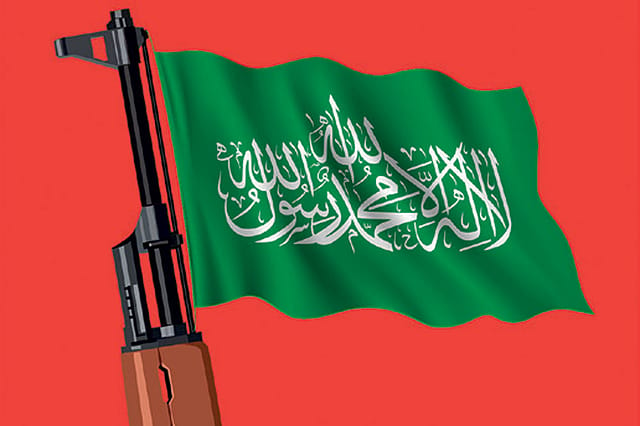The Palestinian Jihad

THE TERRIFYING CLARITY of the moment freezes the arguments we have been using all along to bring a sense of moral equilibrium to history. In such a moment, in the border wilderness of Israel's south, in the last hours of a night, nothing was left for the morning except death and hate. And it clarified, on the 50th anniversary of another war that further fortified Israel's loneliness as a people, how resistance has become terror with a religious adjective, how victimhood has been replaced by vengeance, as if we all, as polarised as ever between the idiotic rhetoric of stolen geography and the still unfolding struggle for the preservation of the homeland, needed another reminder of the dehumanisation and de-secularisation of the Palestinian campaign.
What remains today, in the ghettos of the Gaza Strip, which is currently crying out for attention not as a wreckage of Palestinian dispossession but as the axis of Palestinian jihad, is the cult of death. That is: the perversion of martyrdom, tribal bloodlust hardened by the indoctrination of a neighbouring regime still beholden to a revolution of the Book, and a casual rejection of human life blend to form a nihilistic rage.
This journey of the Palestinian struggle, from the secular romance of resistance, add to that a dash of the poetry of Mahmoud Darwish and the sophistry of Edward Said, to the savage edition of Islamism, sprinkle it with the prophecies of Osama from Mount Jihad and the video-verses from the desert of beheadings, tells a story of brutalisation as well as banalisation.
Imran Khan: Pakistan’s Prisoner
27 Feb 2026 - Vol 04 | Issue 60
The descent and despair of Imran Khan
Once, it was the image of the wandering statesman without a state, in his trademark keffiyeh, and accessorised by an empty holster, that captured the Palestinian struggle. Arafat's Fatah faction, secular in its original making, is nothing more than the custodian of a discredited administration in the West Bank. The 'nationalist' struggle has become a Book-driven hate campaign, and Hamas its sole face, and the shirtless of Gaza its cannon fodder.
The death cult of Islamism, even as it draws from an ancestry of glory and grievances, is sustained by the power of denial, the faith of exclusion. From the morning inferno of 9/11 to the Islamic State's war on civilisation to the Palestinian jihad headed by Hamas, it is about the delegitimisation, and eventually annihilation, of the faithless. For Hamas, Israel is a lie. Truth is to be found in killing and dying and replacing history with a fairy tale. For the death cult, life values nothing.
This evolution of the Palestinian resistance is not matched by the moral arc of our response. The Arafat stereotype sat well with the so-called Third World morality, of which New Delhi was a true apostle. It was a time when all the running dogs of imperialism were by default Zionist collaborators. A time when the poignancy of homelessness made a better slogan of freedom. The slogan remained unaltered even though the poetry of resistance camouflaged some of the most sensational terrorist operations of the last century. International morality was the only shelter the Palestinians could take refuge in then.
In the age of Hamas, the morality has become part of the progressive pieties in which the motif of victimisation continues to be culturally updated, atrocity by atrocity. The Israel-asked-for-it responses emanating from the liberal corners of academia and media show how the jargon of insensitivity pretends to be a moral position. The tyranny of phrases like Islamophobia seeks to block the fundamental right to life and land—and create a doctrine of victimhood out of the staggering mathematics of death. Both Hamas and its sneaky apologists can't be averse to a spiralling death toll in Gaza and chaos beyond it for the sake of victimhood. How many missiles will be required to satiate a twisted morality?
If there is one moral emergency after the Hamas horror, it's called Israel. That India instantly stood by the loss and sorrow of the Jewish state reflects the updated morality of New Delhi. Israel, more than seven decades after its creation, remains a contested land only for those who have been hardened by hate. Israel is built on the memory of overcoming, of rising from the charred remains of the Final Solution. The nation of a biblical tribe may have gained its promised land, but it's not allowed to celebrate homecoming, not yet. Zion is still a destination in the Jewish imagination, and in real time, the existential struggle to reduce the distance never ceases. It's a struggle against god's death squads and the cheerleaders who arm them with arguments without a human content. Can we ever reject its morality?
